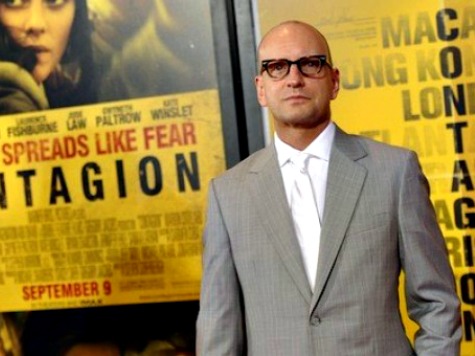Scott Z. Burns, screenwriter for Contagion, is reportedly more frightened by society’s reaction to Ebola than he is the actual virus that has killed nearly 4,500 people.
He told The Wrap while gearing up for his film, which raked in $135 million with the story of the hypothetical MEV-1 virus, that he conducted enough research to conclude scientific knowledge is proficient enough to contain Ebola.
“There are people in the world today who have stared down Ebola successfully in very difficult places – and I am optimistic that if we support those people and give them the resources they need, this can be contained,” he said.
The overall goal of the 2011 medical thriller was to show how lethal airborne viruses, similar to Ebola, can become aggravated by public fear and a lifestyle that makes traveling from disease-ridden countries more convenient.
Jim Berk, CEO of Participant Media, stressed that creators of Contagion considered their film as a warning, because it illustrated a real-life global pandemic.
“While the deadly virus in the film is fictional, the science behind it is not. Top health experts, including those from The Skoll Global Threats Fund, consulted with Scott Z. Burns, Steven Soderbergh, and the cast so that ‘Contagion’ was as realistic as possible,” he said.
Burns reportedly believes the Ebola crisis has advanced to more of a political problem because budget cuts imposed on the Center for Disease Control have been politicized.
“People are blaming the Republicans for cutting funding, and other people are now saying the president also cut funding to the CDC… We’re placing blame, and that’s just not very helpful,” he said.
He also explained the difference between Ebola and the fictional MEV-1 virus in Contagion.
Ebola is a disease we’ve had 40-some years of experience with, so what’s particularly alarming is that even with our experience we’re making a lot of rookie mistakes.
I certainly don’t want to scare people, because that seems what most of the media is doing a great job of doing. But when I did my research, all the experts told me that they expected there to be a pandemic of some kind of influenza, like we saw in World War I with Spanish Flu. And this isn’t that. This is not what they would call the big one.
The film crew reportedly learned from medical consultants that the main problem concerning infectious diseases might not be the science but media coverage, because it instills fear and anxiety in people.
“There are really brilliant researchers who are capable of combatting these diseases. The experts I talked to on the movie are not concerned about the science. They’re concerned about educating people, and about the media scaring people… I think diseases have a way of shining a light on our weaknesses, and that’s what we’re seeing,” said Burns.

COMMENTS
Please let us know if you're having issues with commenting.